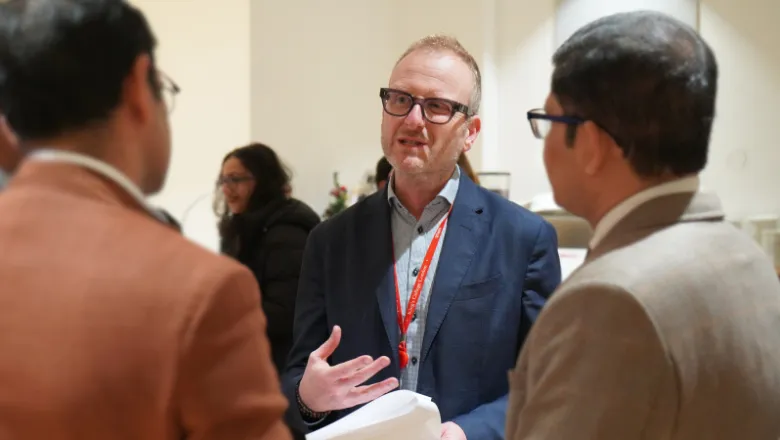22 January 2025
Talking Leadership: Professor Adam Fagan, Vice President (Education & Student Success)
Professor Adam Fagan on transforming assessment at King's, AI and education, and the perfect weekend.

Let’s start at the end. In five years' time, what do you hope education and student success will look like at King?
That’s a really interesting question – like writing a ‘postcard from the future’. Firstly, we will have fully embedded the principles of TASK (Transforming Assessment for Students at King’s). TASK was introduced to improve how students and staff experience the practice and process of assessment. Fundamentally, it is about developing diverse assessment schedules which take into account the overall balance of assessments and evolve over the course of a programme.
Students are not just here to complete assessments, but to learn how to think critically, to think differently, and to enjoy the intellectual endeavour of a degree programme. It’s about assessment for learning, not of learning, and how our assessments help students get the most out of their education, preparing them for the world beyond King’s.
Secondly, we will have championed the very best of digital expertise, innovation, and resources to transform the conventional learning space and how students interact both with each other and with their teachers.
And, thirdly, we will know our students better, actively using student data to choreograph their university experience and the configuration of information and opportunities that is presented to them. Algorithms are now part and parcel of everyday life, and we can harness that to create a bespoke experience for our students. This will gain more and more significance as they come to the end of their degree and start to focus on the next chapter.
What inspired the development of TASK?
One of the key drivers of TASK was student feedback, both through NSS/PTES and individual module evaluations. We have heard both from within King’s and across the sector that students feel they are on an assessment ‘treadmill’, and there are a number of studies linking overassessment with poor mental health and wellbeing. Of course, some form of assessment is essential, but we can do this in a way that gives students the best opportunity to demonstrate their knowledge and progressively develop their skills in preparation for what comes next – whether that’s further study or employment.
TASK doesn’t just look at the balance of formative and summative assessments, for example, but how an assessment schedule looks different in the final year of a student’s degree compared to the first. This is in line with the University’s ambition to enable student success and deliver a transformative education that both challenges and supports students.
At the end of last term, we completed a comprehensive review of all live assessments across all faculties according to the TASK framework. This was a huge undertaking and a significant milestone in terms of understanding how we transform assessment at King’s, and I would like to thank everyone who was involved in this project.
We’ve talked about the benefits of TASK to students. How will staff experience the impact of TASK?
Transforming assessment at King’s is intended to benefit not only students, but staff also. It is our hope that TASK will reduce some of the time and administrative burden surrounding summative assessments, and enable colleagues to spend more time providing feedback and practice opportunities for students within a module. We really took on board colleagues’ feedback when we established the principles of TASK, and decisions regarding the future of individual assessments will still be locally owned. Our role is to support academics to determine the appropriate future of assessment within their discipline.
How does King’s Edge fit into the picture?
King’s Edge is a great example of how we are starting to use data to deliver a bespoke university experience. It brings together a wide variety of extracurricular activities and events in one accessible space to enhance students’ experience, skills and employability. At its simplest, it’s a modern take on the traditional Careers Service. At its most ambitious, it's about guiding students through each stage of their journey with us, using data to tailor this in an agile and responsive way.
The opportunities and challenges of Artificial Intelligence have been the subject of much debate and discussion in recent years. What is your view on AI and education?
My own view is that AI presents some really valuable and exciting opportunities, and from very early on King’s work in this space has been sector-leading. Our guidance and training resources on the use of AI have been downloaded right across the world. Of course, students must be educated on the risks and appropriate usage of generative technologies, but if we acknowledge and incorporate the use of AI within the correct frameworks, we can use this to enhance our teaching and learning.
And, finally, a bit about you. How would you describe a perfect weekend?
That’s an easy one for me. I am a huge fan of swimming, and I try to build my weekend around three swims, one of which is usually outdoors. I might also see friends or a film in the afternoon, but if I can fit in a swim on Friday, Saturday and Sunday, it puts me in the right headspace and sets me up for the week ahead. I love that swimming is for everyone, regardless of age or ability. I only really swim front crawl, though – I can't see the point of the other strokes!

